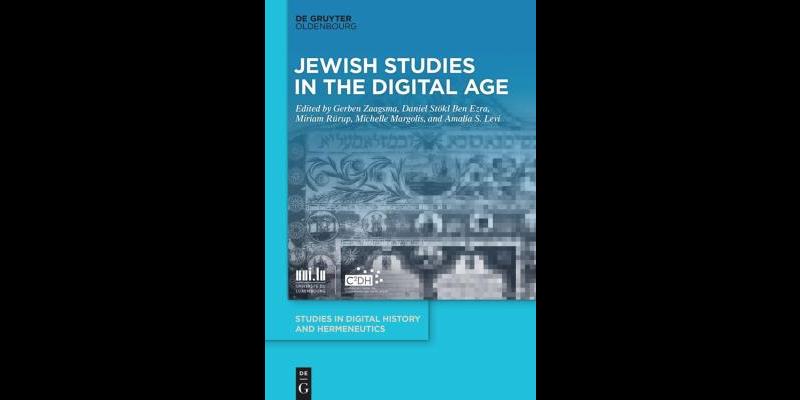We are delighted to announce that our new book Jewish Studies in the Digital Age is out now, in open access.
Jewish Studies in the Digital Age was edited by Michelle Margolis, Amalia S. Levi, Daniel Stoekl Ben Ezra, Miriam Rürup and Gerben Zaagsma. The book is published by De Gruyter Oldenbourg in the series Studies in Digital History and Hermeneutics, which is edited by the Luxembourg Centre for Contemporary and Digital History (C²DH).
The book contains an elaborate introduction that discusses the intersection of Jewish Studies and Digital Humanities within its broader historical context. In four different sections (Collections, Spatiality, Text and Computational) 16 chapters subsequently analyse a broad range of topical, methological and epistemological issues.
Here is the book's abstract:
As in all fields and disciplines of the humanities, Jewish Studies scholars find themselves confronted with the rapidly increasing availability of digital resources (data), new technologies to interrogate and analyze them (tools), and the question of how to critically engage with these developments. This volume discusses how the digital turn has affected the field of Jewish Studies. It explores the current state of the art and probes how digital developments can be harnessed to address the specific questions, challenges and problems that Jewish Studies scholars confront. In a field characterised by dispersed sources, and heterogeneous scripts and languages that speak to a multitude of cultures and histories, of abundance as well as loss, what is the promise of Digital Humanities methods--and what are the challenges and pitfalls?
The articles in this volume were originally presented at the international conference #DHJewish - Jewish Studies in the Digital Age, which was organised at the Centre for Contemporary and Digital History (C²DH) at University of Luxembourg in January 2021. The first big international conference of its kind, it brought together more than sixty scholars and heritage practitioners to discuss how the digital turn affects the field of Jewish Studies.


We are delighted to announce that our new book Jewish Studies in the Digital Age is out now, in open access.
Jewish Studies in the Digital Age was edited by Michelle Margolis, Amalia S. Levi, Daniel Stoekl Ben Ezra, Miriam Rürup and Gerben Zaagsma. The book is published by De Gruyter Oldenbourg in the series Studies in Digital History and Hermeneutics, which is edited by the Luxembourg Centre for Contemporary and Digital History (C²DH).
The book contains an elaborate introduction that discusses the intersection of Jewish Studies and Digital Humanities within its broader historical context. In four different sections (Collections, Spatiality, Text and Computational) 16 chapters subsequently analyse a broad range of topical, methological and epistemological issues.
Here is the book's abstract:
As in all fields and disciplines of the humanities, Jewish Studies scholars find themselves confronted with the rapidly increasing availability of digital resources (data), new technologies to interrogate and analyze them (tools), and the question of how to critically engage with these developments. This volume discusses how the digital turn has affected the field of Jewish Studies. It explores the current state of the art and probes how digital developments can be harnessed to address the specific questions, challenges and problems that Jewish Studies scholars confront. In a field characterised by dispersed sources, and heterogeneous scripts and languages that speak to a multitude of cultures and histories, of abundance as well as loss, what is the promise of Digital Humanities methods--and what are the challenges and pitfalls?
The articles in this volume were originally presented at the international conference #DHJewish - Jewish Studies in the Digital Age, which was organised at the Centre for Contemporary and Digital History (C²DH) at University of Luxembourg in January 2021. The first big international conference of its kind, it brought together more than sixty scholars and heritage practitioners to discuss how the digital turn affects the field of Jewish Studies.
